Previously in the blog: on their rather belated honeymoon, Mr and Mrs Soanes have arrived in the Indian holy city of Varanasi, in time for the 2009 total eclipse of the sun. Now read on…
Varanasi – also known as Benares – is one of the holiest cities to followers of Hinduism. The belief is that if you die in Varanasi, you’ll be released from the wheel of life, and instead of being reincarnated, you head on to … well, a better place.
The River Ganges runs through the heart of the city, and the faithful come to bathe in it from many miles around, as you can see:
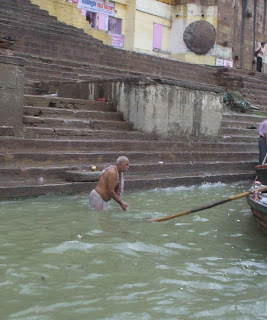

Just a little further along the river from these pictures, on what are known as the ghats, cremations are held; the bodies are wrapped in white burial shrouds and a fire is lit (accelerated with large amounts of clarified butter), and the deceased is cremated. It’s seen as disrespectful to take pictures of the cremations, so we didn’t – but I was particularly interested to find out that the cremations are supervised by one family, who make a considerable amount of money from this, but because of their bottom-rung status in the very strict caste system, are seen as ‘untouchables’. I can’t imagine people of such obvious wealth being social pariahs in the same way in the west, and a part of me almost prefers the fact that money, rarely, isn’t the yardstick of a person’s standing… I said almost.
Every night in Varanasi, they hold a ceremony to honour the sunset – and, I suspect, to seek its rise the following morning – on the banks of the Ganges. We were able to attend this the night before the eclipse, and had really rather good seats, as you can see…
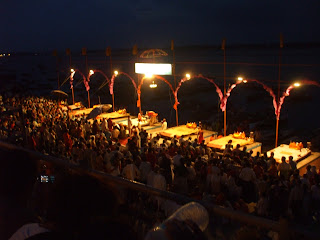
But we were up early the next morning to see the solar eclipse. The sun was due to start being obscured around 5.30am, and so we were up at stupid o’clock to see it, but I have to say it was worth it. And many other people clearly thought this, too – there were thousands of people on the banks of the Ganges to watch it:
 As I say, it was well worth seeing, and being where we were for one of the longest eclipses expected in the next century or so was pretty startling. By now you’ve probably seen the footage of the eclipse (most of which was filmed where we were, as many other areas had cloud cover spoiling the event), but in case you haven’t, here are a couple of snaps…
As I say, it was well worth seeing, and being where we were for one of the longest eclipses expected in the next century or so was pretty startling. By now you’ve probably seen the footage of the eclipse (most of which was filmed where we were, as many other areas had cloud cover spoiling the event), but in case you haven’t, here are a couple of snaps…
One just before –

– and a couple during the eclipse itself (slightly distorted by the effect of the camera, I think, but you get the general idea):
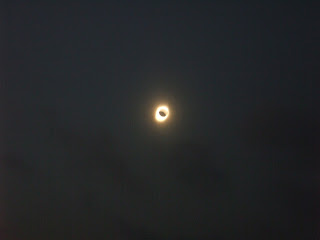
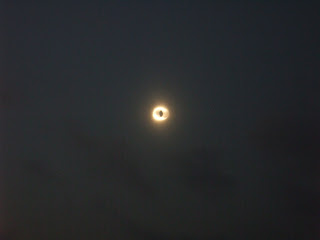
It was, in a very real sense of the word, amazing to behold, and at the moment the moon completed obscured the sun, a gasp-stroke-cheer went up from the crowd, myself included. It was genuinely startling to see, and I have to admit there was a tiny part of me that wondered if the sun was going to come back out… and I wasn’t alone; Varanasi is one of the cities devoted to the god Shiva, who’s linked with the sun, and so when the sun started to emerge once again, the cheer that went up made it like being at a football ground when the home team has just scored; people were very happy indeed.
The path of the moon over the sun was pretty much from NNE to SSW, but oddly enough the local papers reported it with the following pictures:
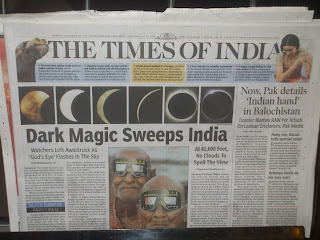
Hmm. Looks like the press are pretty much the same the world over, eh ?
That’s probably enough self-indulgent posting for today, so I’ll stop taking up bandwidth; if you get the opportunity to visit India, though, I heartily recommend it – there’s something overwhelming to all the senses about the immensely busy cities, but the way religion is such a strong part of daily life is almost refreshing, and I found the history and scenery really interesting. It’s very apparent that there’s an enormous amount of poverty – oddly counterpointed by adverts by expensive consumer durables, both on TV and in the teeming streets – so I was kind of mindful of being a ‘poverty tourist’, if you know what I mean. That said, it is, from the admittedly small section of the north of the country we saw, quite fascinating, and we plan to go back.
Okay, I’ll shut up about India now. The usual self-absorption and snark will return tomorrow.
 Clearly, this contest ain’t over until … um, the multi-lingual copyright warnings start to appear on your TV screen.
Clearly, this contest ain’t over until … um, the multi-lingual copyright warnings start to appear on your TV screen.




 In the comics, the origin of the sigils was a running mystery which was gradually explained over the course of a couple of years, but now, well after the event, it occurs to me that perhaps readers might have saved time by looking a bit closer to home for the origin of the sigil:
In the comics, the origin of the sigils was a running mystery which was gradually explained over the course of a couple of years, but now, well after the event, it occurs to me that perhaps readers might have saved time by looking a bit closer to home for the origin of the sigil: 

